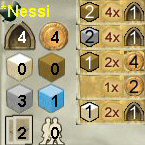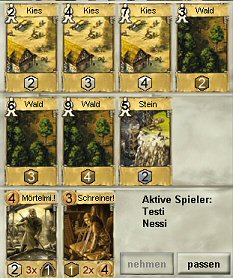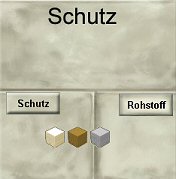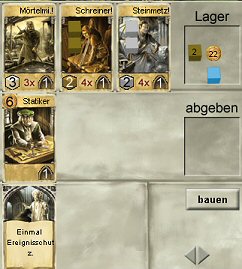Säulen der Erde
SaeulenDerErde (Originalregel)
Game preparation
With /join 2-4 players can enter the game. With /start the game begins. Alternatively, you can use the game management use.
The game
The pillars of the earth are a strategic board game with extensive rules. An overview of the online game is provided here. There is no claim to complete the rules; Rather, operation is to be facilitated. The original rules can be found on the page download.
The players represent the builders who want to build the largest cathedral in the Middle Ages. To this end, they must effectively distribute their workers, recruit skilled craftsmen and the spiritual and worldly rulers must not be neglected. Only those who have enough work in the cathedral building will be able to reach most of the points of victory in the end and will take the victory away.
Field

- Bishop's seat
- wool manufacture
- Kingsbridge
- Priory to Kingsbridge
- Forest/stone quarry
- Royal Court
- Shield
- Castle of Shiring
- Building material market of Kingsbridge
- Cathedral
- Date display
- Costs and costs
- Player display

In the right half of the gambler you can see an overview of your own craftsmen. The handicraft window opens with a click on the player display.
In the left half there is the player name, possibly also the starter symbol (black sachet). Below you can see the number of winning points on the left in the pointed arch, on the right side the existing gold. Then follow the raw materials sand (white), wood (brown), stone (grey) and metal (blue). In the lowermost row, the number of credit cards and the existing workers are shown.
Game sequence
The game runs over six rounds, each of which consists of three phases.
Each player receives at the beginning:
- three builders
- Twelve workers
- two win points
- three craftsmen (Mörtelmischer, Steinmetz, Schreiner)
- the starter gets 20 gold, the following players each one gold more
Phase I
In the first phase craftsmen and building materials cards are selected.

Two craftsmen and seven building materials cards are available each round.
In order to record a building material map, you must be able to provide the required number of workers (top the left on the map). If you don't have enough workers, you have to change or fit your choice.
If you want to take one of the two handicrafts card, you must be able to pay the required price in gold (top the left on the map). As a result five to put craftsmen into his services, a query window is obtained when the sixth is acquired, in which one of his craftsmen must now be selected and delivered; this may also be the newly recruited.
The active player selects a card and confirms its choice by clicking on the "Take" button. The remaining players follow reihum. If you don't want to take a card anymore, you end your train by "pass". All the workers who a player has not deployed now come to the wool factory, where they later provide income. Phase I ends when all cards are assigned or all players have been matched.
Phase II
In the second phase, the three builders of each player are now distributed. This is done by accident. The starter may refuse a builder once per round; this then comes back to the selection and can be pulled back at a later time.
A drawn builder can now be used by his owner in the following places of the schedule:
- Bishop's seat (protection against event)
- Kingsbridge (Take advantage card)
- Priory to Kingsbridge (Siegpunkt)
- Royal Court (tax exemption/metal)
- Shiring
- Shiring Castle (two workers for the next round)
- Building material market of Kingsbridge
- Cathedral (Next starter)

Each possible place is marked by a button.
The cost of using a builder depends on the time of use:

The use of the first pulled builder (if he was not rejected and relocated by the starter) costs seven gold. If or cannot the owner of this builder pay so much, he may place the builder on the cost bar on the field next to the 7 . The next, drawn builder must moan six gold, the following five, etc.
If all builders are pulled, the builders who were "parked" on the cost bar are still used; these are now distributed free of charge by their owners on the schedule, starting at the most expensive field.
Phase III
In the third phase, the actions of the game plan, following the path, are negotiated:
Date
At the beginning of the third phase an event card is revealed. Events always apply to all players. There are positive and negative events. Only the player who has placed a builder with the bishop or has the appropriate advantage card can protect themselves from it (see next point).
Bishop's seat
The player who placed a builder on the bishop's seat can either protect themselves against the (negative) event in this round or alternatively take any raw material from the building material market.

To do this, you choose "protection" or "raw material"; If you choose the raw material, you can also click on the desired one. As long as you have not yet confirmed with "OK", you can still decide.
wool manufacture
Each player now receives a gold for each worker he could put in the wool factory at the end of Phase I. A player can never more than 30 gold they have: Surpluses fall.
Kingsbridge
Kingsbridge has two advantages cards. To select one of them, you place your builder on the Baumeisterfeld below the corresponding map.
Generally there are three types of advantage cards:

These cards are valid until the end of the game.

These cards are allowed once again are used; the owner may, however, determine the time. After inserting the card comes out of the game.

These cards apply once and immediately; i.e. they are deployed immediately and then come out of the game.
Attention: Before the last (sixth) round always the two cards You get 1 metal immediately and You get 1 stone and 1 wood immediately revealed.
Priority
If you place a builder on the first field of Priory to Kingsbridge, you will receive two win points; the one placed on the second field is still rewarded with a victory point.
Construction fields
Each player will now receive raw materials according to the building material maps selected in Phase I.
Royal Court
If the Königshof comes for evaluation, the taxes will be determined for this round. The amount of taxes may be 2/3/4/5 gold, 3 and 4 being twice as likely as 2 and 5.
Players who placed a builder at the Königshof are exempted from taxes for this round. The player who First a builder could place at the king (he must the individual Baumeisterfeld to occupy with the king!), receives a metal for his fidelity.
Shield
In Shiring the two craftsmen now change to their new masters. In contrast to Phase I, the craftsmen here not pay.
Castle of Shiring
The player receives two additional (gray) workers. In the next round - like his own - he can use it either on the building materials fields or in the wool manufactory. At the end of the (next) round, however, he must return it.
Building material market of Kingsbridge
On the building material market, it is only possible to trade who placed a builder there! Players can alternately perform a trading action (in the order from left to right).
For trade in the building material market:
- per action a Raw materialart Buy now or for sale
- for sale you can use as many raw materials
- Buy now you can buy as many raw materials as are available on the market (maximum four at the beginning) and you have enough gold to buy
- metal only sold they are
- the yield/purchase price is 2/3/4/5 gold for sand/wood/stone/metal

You first choose whether you want to buy or sell. Then click on the desired raw material, select the number you want to buy and make the transaction "execut". If you don't want to act further, you leave the window over the corresponding button.
Attention: It is not allowed to buy the same raw material in one round and sell it again, just to prevent it from participating!
Cathedral
The player who placed a builder at the cathedral will be the starter in the following round. If there was no builder there, the starter continues clockwise.
Now all players build on the cathedral according to their craftsmen and raw materials.

The details below on each handicraft card mean from left to right:
- the type of raw material required
- the capacity of the craftsman (how often he can process the raw material at maximum per round)
- Type (Siegpunkt or Gold) and number of earnings
In the example, the stone chip could thus process two stones up to four times each to one victory point; i.e. he could reach four points of victory with a maximum of eight stones.

Each player now decides which craftsman should process the raw materials to win winning points or gold. For this purpose, the corresponding raw materials are drawn from the warehouse to the desired card. Here, in the example, two woods are stored by the carpenter and two stones are stored by the stone chip. The player could now use the remaining two wood for the carpenter.

The craftsmen are negotiated in succession, so that, for example, the gold for the toolmaker can be obtained and then the metal can be processed by one of the other craftsmen. The goldsmith may also process the gold obtained by the toolmaker and the carpenter. The gold stock is displayed twice in this case: once the gold stock, including the expected revenue, and in brackets the revenue by other craftsmen.
At the end of the round, no more than Five raw materials be stored! If a player has more than five, he must "delive" the overcounters in the box.
Once all raw materials have been stored, they confirm their selection with "building".
Attention: If you click on "build" you should check the following:
- Not more than Five raw materials in the warehouse?
- the Right Raw materials on craftsmen?
- too many raw materials on a craftsman (Limit note)?
Playing
The game ends after the sixth round when the cathedral is completed. The winner is the player with most winning points. At the same time, the higher gold sum decides.
Options
dm
There are only two builders in the bag from each player. After that, Phase II is played quite normally until two builders were placed on master fields by each player, i.e. until bags and cost bar are empty. Each player may then use his third builder free of charge. The first builder is used in reverse order. This means that the player who used his first builder as the last one can now use his third builder as the first. Correspondingly, the other players follow up to the player who had set his first builder as the first: he then uses his third builder as the last.
Characteristics:If the event card is revealed that every player is allowed to use only two builders in the next round, then the second pulled builder of a player who cannot protect himself against the event will be put ineffective next to the schedule. The master series is still formed as described above.
Notes
Special function craftsmen
The three craftsmen of mortar mixers, carpenters and stonemasons (marked in each case by an exclamation mark behind the name), of which one has one at the beginning, have special functions which must be observed at the game:
- Other Mortar can no one own Mauritania Get victory points!
- Other Stone metathesis can be a player do not sell stones!
- Other Carpenter can be a player no wood shopping!
Therefore, you should consider what craftsmen you give in the course of the game.
Event card Crafting capacity

In the game there is an event card where the players have the capacity of own craftsmen can increase one. In this event, a hammer symbol appears online, which can be drawn to the desired craftsman who is to produce more.
It should be noted that neither the bell caster nor the organ builder should be increased. Furthermore, toolmakers and Statiker do not have capacity, but have a fixed yield. They can therefore also not be increased.
Payment in cash
In the course of the game, it may happen that a player becomes insolvent (king tax, event). In this case, he pays as much gold as he still has; for the rest, he scores in a ratio of 1:2 (a win point is converted into two gold). It is rounded, i.e. a residual debt of e.g. 3 gold costs only one victory point.
FAQ
- I can't record a building material map -> no longer exist enough workers?
- I cannot record a handicraft card —> not enough gold available?
- I cannot put a builder -> not enough gold available?
- I cannot sell a specific raw material on the market -> the same raw material previously purchased?
- I have received too little money on sale/construction -> limit of 30 gold?
- Why may my opponent have six craftsmen? -> he owns the advantage card 6 craftsmen
Handicraft succession
| Round | Craftsmen | Raw materials | Capacity | Yield | |||||
|---|---|---|---|---|---|---|---|---|---|
| Sand | Wood | Stone | Gold | Metal | Winning points | Gold | |||
| 1 | Mauritania | 0 | 0 | 1 | 0 | 0 | 2 | 1 | 0 |
| Mortar | 2 | 0 | 0 | 0 | 0 | 3 | 1 | 0 | |
| Carpenter | 0 | 1 | 0 | 0 | 0 | 2 | 0 | 4 | |
| Toolmakers | 0 | 0 | 0 | 0 | (1) | (1) | 0 | 2 | |
| 2 | Mauritania | 0 | 0 | 1 | 0 | 0 | 3 | 1 | 0 |
| Statiker | 0 | 0 | 0 | 0 | 0 | (1) | 1 | 0 | |
| Potters | 1 | 0 | 0 | 0 | 0 | 2 | 1 | 0 | |
| Carpenter | 0 | 1 | 0 | 0 | 0 | 2 | 1 | 0 | |
| 3 | Sculptor | 0 | 0 | 1 | 0 | 0 | 1 | 2 | 0 |
| Mauritania | 0 | 0 | 1 | 0 | 0 | 4 | 1 | 0 | |
| Potters | 1 | 0 | 0 | 0 | 0 | 3 | 1 | 0 | |
| Carpenter | 0 | 1 | 0 | 0 | 0 | 3 | 1 | 0 | |
| 4 | Sculptor | 0 | 0 | 1 | 0 | 0 | 2 | 2 | 0 |
| Glass blowers | 1 | 0 | 0 | 0 | 1 | 1 | 3 | 0 | |
| Mauritania | 0 | 0 | 1 | 0 | 0 | 5 | 1 | 0 | |
| Carpenter | 0 | 1 | 0 | 0 | 0 | 4 | 1 | 0 | |
| 5 | Sculptor | 0 | 0 | 1 | 0 | 0 | 3 | 2 | 0 |
| Glass blowers | 1 | 0 | 0 | 0 | 1 | 2 | 3 | 0 | |
| Goldsmith | 0 | 0 | 0 | 0 | 3 | 6 | 1 | 0 | |
| Carpenter | 0 | 1 | 0 | 0 | 0 | 5 | 1 | 0 | |
| 6 | Sculptor | 0 | 0 | 1 | 0 | 0 | 4 | 2 | 0 |
| Bells | 0 | 0 | 0 | 0 | 1 | 2 | 4 | 0 | |
| Goldsmith | 0 | 0 | 0 | 3 | 0 | 8 | 1 | 0 | |
| Organizer | 0 | 1 | 0 | 0 | 1 | 1 | 6 | 0 | |

